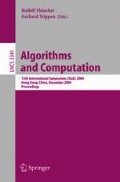Abstract
This paper studies the maximum load in the approximated d-choice balls-and-bins game where the current load of each bin is available only approximately. In the model of this game, we have r thresholds T 1,...,T r (0 < T 1 < ... < T r ) for an integer r (≥ 1). For each ball, we select d bins and put the ball into the bin of the lowest range, i.e., the bin of load i such that T k ≤ i ≤ T k + 1–1 and no other selected bin has height less than T k . If there are two or more bins in the lowest range (i.e., their height is between T k and T k + 1–1), then we assume that those bins cannot be distinguished and so one of them is selected uniformly at random. We then estimate the maximum load for n balls and n bins in this game. In particular, when we put the r thresholds at a regular interval of an appropriate Δ, i.e., T r − T r − 1 = ...T 2 − T 1 = T 1 = Δ, the maximum load L(r) is given as \((r+O(1))\sqrt[r+1]{\frac{r+1}{(d-1)^{r}}{\rm ln}{\it n}/{\rm ln}(\frac{r+1}{(d-1)^{r}}{\rm ln}{\it n})}\) The bound is also described as L(Δ) ≤ {(1 + o(1))ln ln n + O(1)}Δ/ln ((d – 1)Δ) using parameter Δ. Thus, if Δ is a constant, this bound matches the (tight) bound in the original d-choice model given by Azar et al., within a constant factor. The bound is also tight within a constant factor when r = 1.
Access this chapter
Tax calculation will be finalised at checkout
Purchases are for personal use only
Preview
Unable to display preview. Download preview PDF.
References
Adler, M., Chakrabarti, S., Mitzenmacher, M., Rasmussen, L.: Parallel randomized load balancing. Random Structures and Algorithms 13(2), 159–188 (1998)
Azar, Y., Broder, A.Z., Karlin, A.R., Upfal, E.: Balanced allocations. SIAM Journal on Computing 29(1), 180–200 (2000)
Barbour, A.D., Holst, L., Janson, S.: Poisson Approximation. Oxford University Press, Oxford (1992)
Berenbrink, P., Czumaj, A., Steger, A., Vöcking, B.: Balanced allocations: the heavily loaded case. In: Proceedings of the 32nd annual ACM Symposium on Theory of Computing, pp. 745–754 (2000)
Drinea, E., Frieze, A., Mitzenmacher, M.: Balls and bins models with feedback. In: Proceedings of the 11th annual ACM-SIAM Symposium on Discrete Algorithms, pp. 308–315 (2002)
Karp, R., Luby, M., Meyer auf de Heide, F.: Efficient PRAM simulation on a distributed memory machine. Algorithmica 16(4/5), 517–542 (1996)
Mitzenmacher, M.: Load balancing and density dependent jump markov processes. In: Proceedings of the 37th IEEE Symposium on Foundations of Computer Science, pp. 213–222 (1996)
Mitzenmacher, M.: The power of two choices in randomized load balancing. PhD thesis, University of California, Berkeley (1996)
Mitzenmacher, M.: The power of two choices in randomized load balancing. IEEE Transactions on Parallel and Distributed Systems 12(10), 1094–1104 (2001)
Mitzenmacher, M., Prabhakar, B., Shah, D.: Load balancing with memory. In: Proceedings of the 43rd IEEE Symposium on Foundations of Computer Science, pp. 799–808 (2002)
Mitzenmacher, M., Richa, A.W., Sitaraman, R.: The power of two random choices: a survey of techniques and results. In: Handbook of Randomized Computing, vol. 1, pp. 255–312. Kluwer Academic Publishers, Dordrecht (2001)
Mitzenmacher, M., Vöcking, B.: The asymptotics of selecting the shortest of two, improved. In: Analytic Methods in Applied Probability: In Memory of Fridrih Karpelevich, pp. 165–176. American Mathematical Society, Providence (2002)
Monasson, R., Zecchina, R., Kirkpatrick, S., Selman, B., Troyansky, L.: Determining computational complexity from characteristic phase transitions. Nature 400, 133–137 (1999)
Motowani, R., Raghavan, P.: Randomized Algorithms. Cambridge University Press, Cambridge (1995)
Vöcking, B.: How asymmetry helps load balancing. In: Proceedings of the 40th IEEE Symposium on Foundations of Computer Science, pp. 131–140 (1999)
Vöcking, B.: Symmetric vs. asymmetric multiple-choice algorithms (invited paper). In: Proceedings of the 2nd ARACNE workshop, pp. 7–15 (2001)
Vvendenskaya, N.D., Dobrushin, R.L., Karpelevich, F.I.: Queuing systems with selection of the shortest of two queues: An asymptotic approach. Problems of Information Transmission 32(1), 15–27 (1996)
Author information
Authors and Affiliations
Editor information
Editors and Affiliations
Rights and permissions
Copyright information
© 2004 Springer-Verlag Berlin Heidelberg
About this paper
Cite this paper
Iwama, K., Kawachi, A. (2004). Approximated Two Choices in Randomized Load Balancing. In: Fleischer, R., Trippen, G. (eds) Algorithms and Computation. ISAAC 2004. Lecture Notes in Computer Science, vol 3341. Springer, Berlin, Heidelberg. https://doi.org/10.1007/978-3-540-30551-4_48
Download citation
DOI: https://doi.org/10.1007/978-3-540-30551-4_48
Publisher Name: Springer, Berlin, Heidelberg
Print ISBN: 978-3-540-24131-7
Online ISBN: 978-3-540-30551-4
eBook Packages: Computer ScienceComputer Science (R0)

